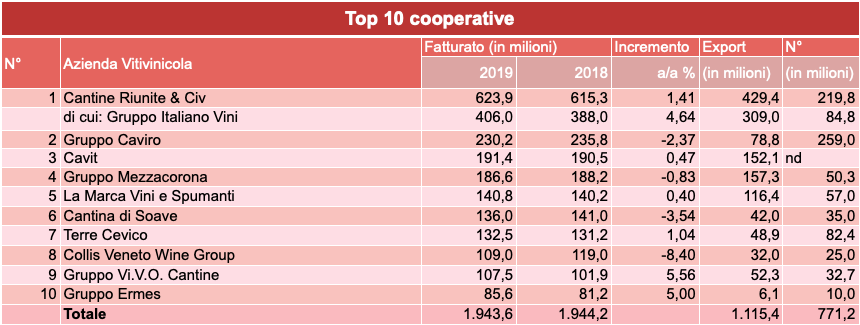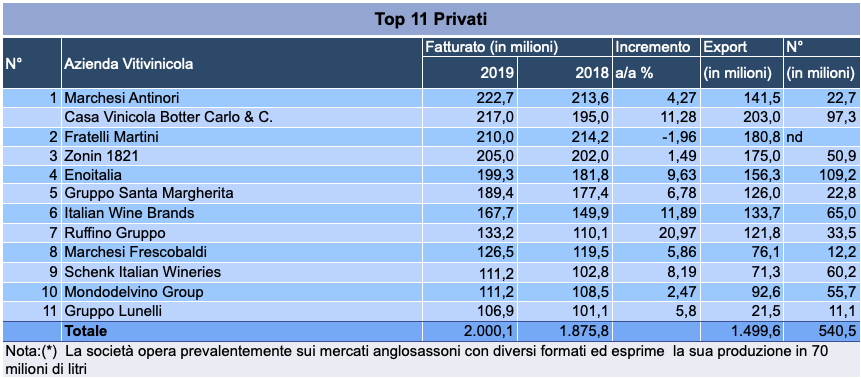History, culture and passion. Three words to define Italian wine, one of the most renowned in the world for its elegance and finesse. It is no coincidence that our country has conquered the position of world leader in this field: in ancient times it was given the name of Enotria tellus, that is, land of wine. Even if every year we find ourselves competing with new players capable of producing excellent quality wines at competitive prices, together with historic rivals, such as France and Spain, Italy continues to hold the court.
105 wineries had an increase in turnover at the end of 2019, thanks above all to the growth in exports at a national level, for a value of 4 billion. It is a significant sample of the national wine industry which represents 47,35% of the sector's total turnover, 62,7% of exports and 35% of domestic turnover.
These data emerge from ranking of the major Italian vineyard operators in 2019 drawn up every year by Anne of Martin, financial journalist and food and wine expert, published by Corriere Economia.
All together these companies represent 6,8 billion in turnover, 158 hectares in production between owned and rented vineyards, over 2 billion bottles and 12.536 employees. Among the 105 wineries, 41 are cooperatives and 64 are private companies, many family-run and handed down from generation to generation. These include many well-known names of Made in Italy wine such as: Marchesi Antinori, Marchesi, Frescobaldi, Umani Ronchi, Mastroberardino, Planeta, Marchesi Mazzei, Barone Ricasoli, Tasca d'Almerita, Donnafugata, Marchesi di Barolo, Argiolas, Banfi, Allegrini, Fiefs of San Gregorio, Carpineto, Bortolomiol, Montelvini.

In the world of cooperatives, several very well-known names stand out in the wine market, at the top the Cantine Riunite & Civ, of which the main portion is obtained thanks to the Italian Wine Group (406 million). Not bad too Caviro Group, Cavit (the cellar of Trentino winemakers), Mezzacorona, the Cantina di Soave and Terre Cevico. However, if you look at the numbers for 2019 there are some losses in terms of turnover, as in the case of Caviro, famous for the Tavernello brand (-2,37%), and of the Soave winery (-3,54%), this the latter with a more sustained loss but which in any case boasts a turnover of around 136 million euros, against 141 million in 2019.
Growing Terre Cevico (+1,04%), Vi.VO Cellars Group (+ 5,56%) among the major producers of Prosecco and Pinot Grigio and, finally, Hermes Group (+5%). La Marca Vini e Spumanti also recorded an increase compared to the previous year, albeit a slight one (+0,40%).
Losses, however, for the Mezzacorona group (-0,83%), but worse for Collis Veneto Wine Group: with a turnover down by 8,40%. The Venetian company of the Botter family, on the other hand, climbs the rankings by winning fourth place. One of the highest growths in just two years, together with Ruffino Gruppo, a Tuscan brand owned by Constellation Brands which goes from a turnover of 110,1 million to 133,2 million euros in the top private sector.

Among these in the first place we find Marchesi Antinori, with an increase of 4,27% compared to 2018. The noble family that has been dedicated to wine for over 25 generations has acquired countless important estates in Italy and around the world over the years. One hail lower we find i Martini Brothers, the Piedmontese company famous for its wines and aperitifs, with a decrease in turnover of 1,96%.
Instead, there are companies that operate on several fronts, both at an industrial and productive level. For example, the Mondodelvino group, owned by the Martini family with a turnover of 111,2 million, also invests heavily in consumers online, thanks to the new multi-channel platform launched in full lockdown.
It also ranks very well Schenk Italian Wineries, the Italian branch of the Swiss group also active in France and Spain (with an increase of 8,19%), e the Italian Wine Brands, the wine group that operates mainly in large-scale distribution and abroad (listed on the Aim with a turnover of 167,7 million), is achieving good results, also underlined by the Mediobanca report on the wine market: going from around 80 million in capitalization to current 117 million in just 4 months and in the Coronavirus era. Very good too Zonin 1821 which takes third place (+1,49%), Santa Margherita Group (+6,78%), but above all Enoitalia, which conquers the fourth place of the Top 11 Private Individuals, with an increase of 9,63%. Winery founded in 1986, owe their success to the foreign market, as it represents about 75% of their turnover.
As it regards instead the major exporters, the top ten drawn up by AnnaDi Martino in her annual ranking, sees the Bolognese in the lead Sgarzi cellars of Castel San Pietro which practically sells only abroad (98,99%). They are in second and third place respectively Farnese (96,6%) e Botters (93,5%). Very good also for Ruffino and Castellani who exceed the 90% quota. Pasqua Vigneti e Cantine also recorded sustained increases, thanks to its overseas subsidiaries. To complete the ranking are Cantine Volpe (among the most committed organic producers), Carpineto, Fratelli Martini and Tommasi family Estates. Immediately after there are 7 other companies that record an incidence of sport of more than 80%: Zonin 1821, Bottega, Mezzacorona, Mondodelvino, Umberto Cesari, La Marca, Allegrini.
What are the private companies that achieve the best results in economic terms? The most significant indicator is the one that photographs the profitability expressed by the ratio between EBITDA and turnover which, obviously, does not concern the cooperative world.
In 2019, in first place is the San Guido estate which tops the ranking with 59,23%. In second place, Marchesi Antinori with a share of 47,50%, with a turnover of 222,7 million. Following the Sicilian cellar of the brothers Diego and Alberto Cusumano (with an index of 36,51%). Below a couple of percentage points we find Marchesi Frescobaldi with 33,99%. On the other hand, the Venetian group Santa Margherita of the Marzotto brothers confirms itself in fifth place, with the new CEO Beniamino Garofalo. The Tuscan Castellani earns more than 4 points and takes sixth place with 28%, followed by Donnafugata with an index of 26,5%. The Sardinian winery Argiolas and therefore the major maison of Franciacorta Guido Berlucchi are not missing. Closing the top ten are the Lunelli family, the big names in Ferrari and Bisol bubbles.
Let's move on to the ranking of major bottlers among private companies. With over 109 million pieces it is confirmed at first place for Enoitalia, which translate into a turnover of 199,3 million. While winning the silver medal Botter with 97,3 million and the bronze medal goes to Contri Spumanti, with 72,5 million. Also in the top ten are Cielo e Terra, with 35,7 million, among the most important operators in the large-scale distribution and Schenk Italian Wineries, led by Daniele Simoni: it produced over 60 million bottles, reversing the situation of 2018. After the first 10, there are other important houses, such as Chiarli from Emilia (with 20 million bottles), queen of the international wine rankings with the popular Lambrusco. Or even the Sicilian brand Duca di Salaparuta (with 11 million) which belongs to Ilva di Saronno.
What about cooperatives? Anna Di Martino clarifies that it is difficult to make this analysis given that cooperatives often operate in bulk. But if we consider the South Tyrolean realities, awarded by wine critics for the quality of their wines, we come across a high average price (at least more than 8 euros), as for the San Michele Appiano winery and the Tramin winery. The best performance in terms of bottles, however, is from the Caviro Group, with 259 million pieces. Maid of honor the Cantine Riunite & Civ with 219,8 million bottles, of which 84,8 belonging to the Gruppo Italiano Vini. Terre Cevio is in third place with 82,4 items. And again La Marca Vini e Spumanti (57 bottles), Gruppo Mezzacorona (50,3) and Cantina Soave with (35).
Instead, it ranks first in the rankings greater increases in total turnover, the Trentino cooperative Toblino winery, Followed by Ruffino with the strongest growth among the big names. The Apulian Varvaglione 1921, Latentia Winery and Le Chiantigiane they respectively hold the third, fourth and fifth place. A good result also for the Abruzzo-based Farnese Group, led by its president and founder Valentino Sciotti, leader of an operating model that does not envisage vineyard ownership but the leasing of the vineyards of over 3 winegrowers in 6 different regions. It is a functional model that has also conquered the American investment giant Platinum Equity, which has entered the majority of the Abruzzo group.
While on the podium of the largest increases in exports we find in order Latentia winery, Ruffino and Terre Cevico. This shortlist also includes Caviro, Cielo e Terra, Enoitalia, IWB, Contri and the wine hub of Genagricola, the agri-food holding of Assicurazioni Generali led by the new CEO Igor Boccardo. A good export also for Mionetto, a leading company on the bubbles market which together with Contri and Villa Sandi closes the trio of wineries with a turnover of over 90 million euros.
Numerous positives for the Italian vineyards, which close 2019 with growing numbers compared to the previous year, confirming an entire reorganization process but also a strengthening of the private and cooperative sector. Even if for 2020 the hopes of obtaining such positive results almost seem like a dream, due to the epidemiological crisis that has affected the whole world, the last word has not yet been said.





